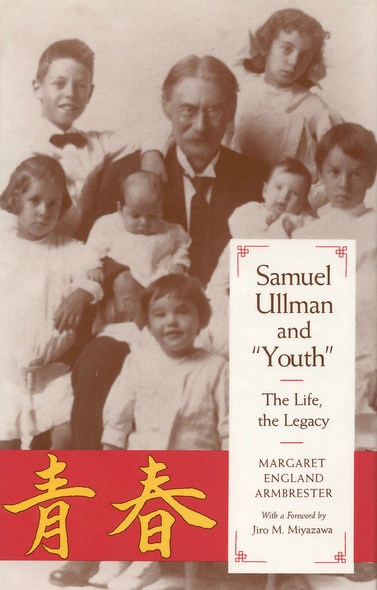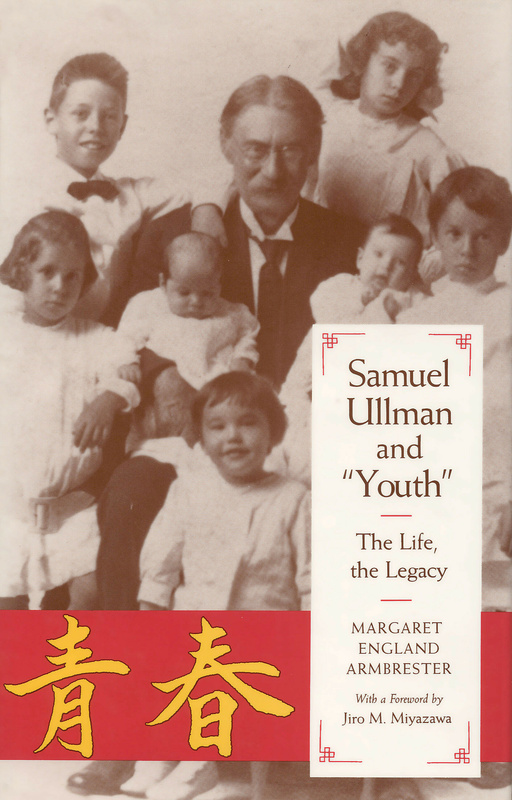Samuel Ullman and "Youth"
The Life, the Legacy
By Margaret E. Armbrester; Foreword by Jiro M. Miyazawa
University of Alabama Press
Examines a poem that has not only withstood the vicissitudes of time, but has spread around the world like the waves lapping at a beach
Thousands of wonderful and sometimes strange fads have captured the public fancy in the almost five decades since the end of World War II. Most have been short-lived and soon faded away. There is, however, a poem that has not only withstood the vicissitudes of time, but has spread around the world like the waves lapping at a beach. This is the poem "Youth," by Samuel Ullman.
In December 1945, the Reader’s Digest published the poem and reported that General Douglas MacArthur, Commander of the Allied Forces, Far East, kept a copy of the poem near his desk.
Around that time, Yoshio Okada, a Japanese businessman, bought a copy of that December 1945 edition of the Reader's Digest, read the poem and was deeply affected by it. He translated it into Japanese and displayed it in his office as a guiding inspiration. Many of Okada's friends read the poem and were fascinated by its beauty. It began to receive national publicity through newspapers and magazines and became popular throughout Japan, especially among the intellectual community. Part of the reason for this widespread popularity is the excellence of the translation. Yoshio Okada, a man of noble character, gifted with a profound philosophy of life and literary talent, translated the poem into a beautiful, soulstirring Japanese version.
Samuel Ullman's “Youth” reflects the truth of life, and his outcry of spirituality touches the intrinsic nature of man.
Thousands of wonderful and sometimes strange fads have captured the public fancy in the almost five decades since the end of World War II. Most have been short-lived and soon faded away. There is, however, a poem that has not only withstood the vicissitudes of time, but has spread around the world like the waves lapping at a beach. This is the poem "Youth," by Samuel Ullman.
In December 1945, the Reader’s Digest published the poem and reported that General Douglas MacArthur, Commander of the Allied Forces, Far East, kept a copy of the poem near his desk.
Around that time, Yoshio Okada, a Japanese businessman, bought a copy of that December 1945 edition of the Reader's Digest, read the poem and was deeply affected by it. He translated it into Japanese and displayed it in his office as a guiding inspiration. Many of Okada's friends read the poem and were fascinated by its beauty. It began to receive national publicity through newspapers and magazines and became popular throughout Japan, especially among the intellectual community. Part of the reason for this widespread popularity is the excellence of the translation. Yoshio Okada, a man of noble character, gifted with a profound philosophy of life and literary talent, translated the poem into a beautiful, soulstirring Japanese version.
Samuel Ullman's “Youth” reflects the truth of life, and his outcry of spirituality touches the intrinsic nature of man.
An engaging view of an American life that, as the author demonstrates, ‘refined the meaning of success.’’
—Asahi Evening News
Ullman today would be largely forgotten but for an accident: in his retirement he wrote poetry. Some of this verse was printed in a book in 1922 and one of these poems was somehow seen by Douglas MacArthur, who hung a framed copy on the wall of his office in Japan. This poem was ‘Youth,’ and it became enormously popular among the Japanese, who became curious about the author. . . . Almost nothing on the man existed, leading to frustration on all levels.
With the publication of Armbrester’s biography of Ullman, the situation is rectified. Her account . . . provides a highly readable and well-documented history of Ullman [and] reprints his verse, which is almost impossible to locate. The book provides the first account of a man who inadvertently changed many peoples’ lives, it is enjoyably written, and it is nicely indexed.’
—Academic Library Book Review
Margaret England Armbrester is a historian at the University of Alabama at Birmingham.
Jiro M. Miyazawa was a founder of the Toppan Moore Company and Chairman of The Youth Association in Japan.
Jiro M. Miyazawa was a founder of the Toppan Moore Company and Chairman of The Youth Association in Japan.





